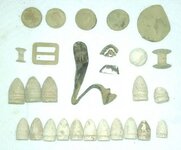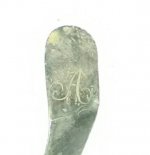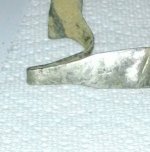gtoast99
Sr. Member
Hey Ya'll! I tried three new spots with my friend Dustin a few days ago. The first two didn't pan out, but persistence pays off!
Mostly Colt pistol, one Smith, three Merrill's, one fired round ball. I'm not sure what the small carved bullet started out as, but I always like carved lead.
As for brass, I found my second kepi hat buckle, two button backs, one incredibly fragile General Service eagle button, and two early flat buttons. One is a large copper button, fairly thin and plain. The other is a smaller, probably a bit later, and has a nice silver wash. It should clean up well. Dustin also found a beautiful silvered colonial dandy button with a star design, as well as some more Civil War relics.
My find of the hunt was this plow damaged silver spoon. Although the condition leaves a lot to be desired, It's one of my favorite recoveries of my detecting career. I searched for more pieces of the spoon bowl, but the ones I did find were scattered over a surprisingly large area by farming activity. The spoon handle has an ornate monogrammed letter "A". From our research into the site beforehand, we knew the family that owned the farm during the war lived in a nearby home since the late 1700's... and their surname started with that same letter "A". I think it is highly likely that the two are connected, but of course we will never know for certain.
The spoon is also hallmarked by the maker on the back - the letters "HW" in a rectangle with triangle cutouts on the sides.. Through the help of a friend who collects early American silver, we were able to find the maker of the spoon was Henry Wills, of New York, sometime around 1774. WOW! That means the spoon I removed from that field was hand crafted before this country had seen it's first Independence Day. What an incredible hobby!!
I'll close with one last bit of speculation. I do know approximately where the home site is located, and it is down the road a distance from the field we were detecting. It's likely that the early flat buttons we recovered were from farming activities in the fields over the years. It's also quite possible that the colonial spoon was lost in that field in a similar manner - the owners were having a meal in the field and it lay there for the next 200 years. But is there another explanation? I do have one primary source document that mentions that the house was looted by Yankee cavalry during the war. Is it possible that this silver spoon was taken as spoils of war and left in camp? Of course, it is all speculation, and we will probably never know. But it is interesting to think about.
Thanks for looking, happy hunting, and God bless.
Mostly Colt pistol, one Smith, three Merrill's, one fired round ball. I'm not sure what the small carved bullet started out as, but I always like carved lead.
As for brass, I found my second kepi hat buckle, two button backs, one incredibly fragile General Service eagle button, and two early flat buttons. One is a large copper button, fairly thin and plain. The other is a smaller, probably a bit later, and has a nice silver wash. It should clean up well. Dustin also found a beautiful silvered colonial dandy button with a star design, as well as some more Civil War relics.
My find of the hunt was this plow damaged silver spoon. Although the condition leaves a lot to be desired, It's one of my favorite recoveries of my detecting career. I searched for more pieces of the spoon bowl, but the ones I did find were scattered over a surprisingly large area by farming activity. The spoon handle has an ornate monogrammed letter "A". From our research into the site beforehand, we knew the family that owned the farm during the war lived in a nearby home since the late 1700's... and their surname started with that same letter "A". I think it is highly likely that the two are connected, but of course we will never know for certain.
The spoon is also hallmarked by the maker on the back - the letters "HW" in a rectangle with triangle cutouts on the sides.. Through the help of a friend who collects early American silver, we were able to find the maker of the spoon was Henry Wills, of New York, sometime around 1774. WOW! That means the spoon I removed from that field was hand crafted before this country had seen it's first Independence Day. What an incredible hobby!!
I'll close with one last bit of speculation. I do know approximately where the home site is located, and it is down the road a distance from the field we were detecting. It's likely that the early flat buttons we recovered were from farming activities in the fields over the years. It's also quite possible that the colonial spoon was lost in that field in a similar manner - the owners were having a meal in the field and it lay there for the next 200 years. But is there another explanation? I do have one primary source document that mentions that the house was looted by Yankee cavalry during the war. Is it possible that this silver spoon was taken as spoils of war and left in camp? Of course, it is all speculation, and we will probably never know. But it is interesting to think about.
Thanks for looking, happy hunting, and God bless.
Amazon Forum Fav 👍
Attachments
Upvote
19










